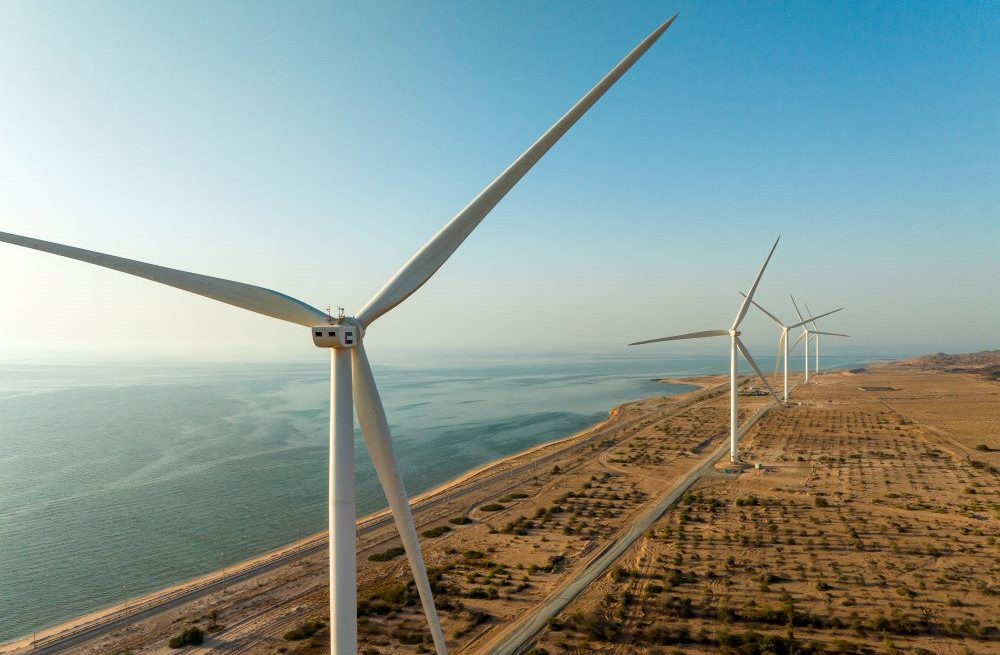Migrant workers in solar and wind project supply chains say they suffer exploitative recruitment fees, wage theft and illegally long hours in dangerous heat
Migrants working on renewable energy projects in the United Arab Emirates say they are the victims of abusive conditions that could amount to forced labour, an investigation by a human rights group has found.
Equidem interviewed 34 migrant workers from South Asia and Sub-Saharan Africa employed in the supply chain of 10 major renewable energy developers mostly from Europe and the Gulf States, which operate solar and wind projects in the UAE.
They worked for 14 local subcontracting companies, including renewables specialists such as solar installers and technicians, and firms providing services such as transport, security and cleaning.
Two-thirds of interviewed workers said they experienced wage theft, through unpaid, delayed or irregular wages. Half reported working illegally-long hours and as many said they were charged recruitment fees – a practice widely deemed exploitative because it can lead to debt bondage. It is illegal in the UAE. Some workers also said their passports had been illegally withheld.
Mustafa Qadri, chief executive of UK-based Equidem, told Climate Home News the findings were “shocking” for a “high-tech sector” responsible for “some of the most sought-after investment opportunities in the global market”.
The labour rights advocacy group found violations in breach of UAE labour law and international standards that matched 10 of the 11 International Labour Organization’s indicators of forced labour.
This “create[s] conditions of forced labour for migrant workers in the renewables sector in the UAE,” Equidem concluded in a report released on Tuesday.
Treated ‘like animals’
The Gulf States continue to produce and export high volumes of oil and gas but have seen a rapid rollout of renewable energy infrastructure in recent years, reaching 5.6 gigawatts in 2022 from close to zero a decade earlier. The UAE – which hosted the COP28 climate summit last year – is one of the region’s fastest-growing renewable markets but it has “been rapidly built on the back of exploitation”, Qadri said.
Interviewees reported workplace discrimination, violence and harassment, especially targeted at new workers. One said he was living in overcrowded and unsanitary accommodation with 18 others, while half said their food allowances weren’t enough to meet their needs.
“The company treats all the workers like animals,” Suaid, an Indian worker subcontracted to pack solar equipment for a European renewable energy developer, told Equidem. “I work for 12 hours a day. If I do my work comfortably, the work will not be finished and if the work is not finished, the supervisor will shout at me. Even my salary can be cut. There is so much work that I do not get even a minute’s rest.”
Equidem chose not to identify projects and employers linked to rights violations because of the risk of reprisals for workers. “These workers are facing terrible conditions and suffering in incredible silence,” said Qadri.
The UAE government did not respond to Climate Home’s request for comment.
Double climate impacts
Migrant workers account for a vast proportion of private-sector employment in Gulf countries.
Mass public events such as the 2022 Qatar World Cup and the 2020 Dubai Expo have exposed some of the risks and abuses faced by migrant workers in the region. The Business & Human Rights Resource Centre (BHRRC), which co-authored the report, has recorded 490 allegations of migrant worker abuse across Gulf States since 2022.
But some of the alleged abuse unveiled by Equidem is unique to the renewable energy sector, said Qadri, citing the extent of illegal working hours and workers’ isolation from urban centres while employed at renewable energy projects located in the desert, which also exposes them to heat stress.
Ten workers told Equidem they suffered health impacts after engaging in physical work in extreme temperatures without adequate water and breaks.
“Sometimes I am made to stand more than 10 hours in the scorching sun,” said Akira, a Kenyan worker employed as a security guard for a multinational energy company.
Fractious COP29 lands $300bn climate finance goal, dashing hopes of the poorest
Climate change is expected to make the UAE even hotter and more humid between June and September – a combination that can be deadly.
The interviewed workers originated from developing countries such as Kenya, India and Pakistan, where extreme weather impacts fuelled by climate change, from heatwaves to droughts and floods, are intensifying. Equidem previously found evidence of migrant workers seeking jobs in the UAE after losing their livelihoods to flooding in their home country.
Opaque supply chain
The investigation unmasks a sector characterised by multiple layers of outsourcing, where contractual ties between workers, subcontractors and major renewable energy developers are rarely disclosed.
This “blind spot” increases the risk of abuse, Isobel Archer of BHRRC told Climate Home.
BHRRC reviewed publicly available governance policies of the 27 largest renewable energy developers in the Gulf region, including French companies EDF and TotalEnergies, Chinese firm Jinko Power, the UAE’s state-owned Masdar and Shell.
It found that ju
Read More

